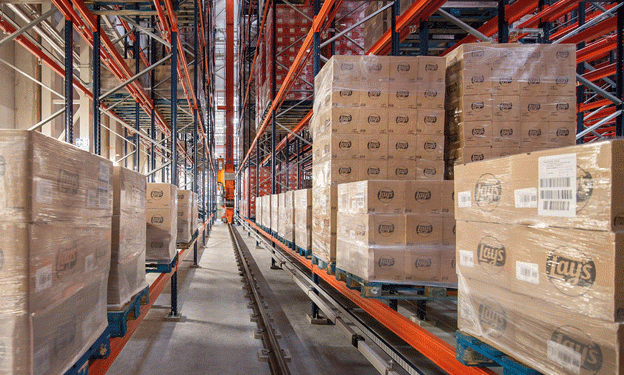In response to growing demands across Europe, PepsiCo has taken a major leap in supply chain efficiency with the installation of its first automated warehouse in Poland. Located in Środa Śląska, the facility is dedicated to producing and storing Lay’s potato chips and Doritos nachos, primarily distributed to Germany. This cutting-edge project, executed in partnership with warehouse automation specialist Mecalux, reflects PepsiCo’s commitment to streamlining logistics, enhancing sustainability, and optimizing productivity across its snack food supply chain.
High-Volume Production Requires Advanced Storage Solutions
The scale of operations at Środa Śląska is staggering. Each year, the plant processes 60,000 tons of potatoes for Lay’s and 15,000 tons of corn for Doritos. To meet this demand efficiently, PepsiCo implemented a “push” production strategy, manufacturing in advance to keep up with projected demand. This high production volume requires a sophisticated approach to storage and logistics, making the newly automated warehouse a crucial addition.
The warehouse, equivalent in size to seven football fields, is equipped with 9,000 storage positions and handles a high volume of pallets daily, all filled with ready-to-ship snack products. This automated facility ensures a seamless flow from production to packaging and, ultimately, distribution.
Integrating Easy WMS for Seamless Operations
A key feature of PepsiCo’s new warehouse is the use of Mecalux’s Easy WMS (Warehouse Management System). This software is fully integrated with PepsiCo’s SAP ERP system, allowing real-time stock tracking, automatic order processing, and synchronization of production and distribution. Easy WMS optimizes each phase of storage, from tracking incoming goods to efficiently organizing pallets based on their destination, vehicle type, client priority, and delivery route.
According to Maciej Pietrusa, the warehouse manager, “The production process is fully integrated with the automated warehouse, enabling each bag of chips to be transported from production to packaging and loading bays with minimal manual intervention.” The integration of Easy WMS reduces errors, increases efficiency, and offers complete traceability.
Enhanced Efficiency with High-Capacity Pallet Handling
Mecalux installed four stacker cranes and a network of pallet conveyors, ensuring the rapid movement of goods within the warehouse. The system manages 3,500 pallet transfers daily, operating continuously to maintain PepsiCo’s high production pace. A dynamic, double-channel conveyor system groups pallets based on delivery schedules, minimizing errors and ensuring on-time shipment.
This level of automation significantly improves operational speed and accuracy, addressing the challenges of high-output production and reducing reliance on manual labor. The result is a supply chain capable of supporting PepsiCo’s expanding European market demands with less energy consumption, aligning with the company’s sustainability goals.
A Model for Modernizing Global Supply Chains
PepsiCo’s partnership with Mecalux in Środa Śląska has been a success, leading to similar plans for their facility in Veurne, Belgium—one of PepsiCo’s largest plants in Europe. The Polish warehouse project illustrates how advanced automation, combined with efficient warehouse management software, can revolutionize logistics in the food industry.
This integration of high-capacity automated storage with real-time digital management reduces both logistical costs and environmental impact, positioning PepsiCo as a leader in efficient, sustainable supply chain practices. Moreover, this project aligns with broader industry trends toward automation, making PepsiCo a model for modernized logistics in food production.
PepsiCo’s automated warehouse in Środa Śląska represents a significant advancement in supply chain logistics, showing how innovative technology can transform storage, handling, and distribution in high-demand food production. With the benefits of automation and integrated digital systems, PepsiCo sets a standard for the efficient, sustainable food supply chains of the future. As PepsiCo continues to optimize its European operations, the success of this warehouse model offers a blueprint for similar enhancements across its global network.







